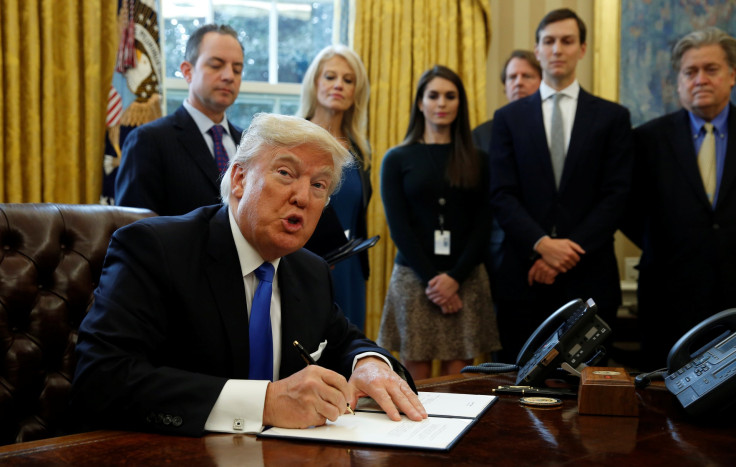Twitter Reacts To The Supreme Court Reinstating Parts Of The Travel Ban

The Supreme Court announced Monday that it will decide whether or not President Donald Trump’s revised travel ban was lawful. The revised executive order issued in March limited travel to the U.S. from six majority-Muslim countries for 90 days. The order also completely stopped America’s refugee program for 120 days. The order said the reason for banning travel was so that the government could reexamine its vetting process. The court will take up the case in October.
Lower courts blocked much of the order, but the Supreme Court lifted the injunction, allowing parts of the ban to be implemented. The Supreme Court did make a caveat in their opinion. Foreigners with ties to the U.S. such as family or businesses would not be blocked by the ban. So the ban now will affect only travelers with no prior ties to the U.S. The six countries are Iran, Libya, Somalia, Sudan, Syria and Yemen.
READ: California Travel Ban: What Is The Travel Law And How Many States Are Involved?
“In practical terms, this means that may not be enforced against foreign nationals who have a credible claim of a bona fide relationship with a person or entity in the United States. All other foreign nationals are subject to the provisions of (the order),” read the unsigned decision.
Justices Clarence Thomas, Samuel A. Alito Jr. and Neil M. Gorsuch dissented from part of the opinion and felt that the full ban should be put back in place, regardless of if people had a relationship in the U.S.
“I fear that the Court’s remedy will prove unworkable. Today’s compromise will burden executive officials with the task of deciding—on peril of contempt— whether individuals from the six affected nations who wish to enter the United States have a sufficient connection to a person or entity in this country,” wrote Thomas in the dissent. “The compromise also will invite a flood of litigation until this case is finally resolved on the merits, as parties and courts struggle to determine what exactly constitutes a “bona fide relationship,” who precisely has a “credible claim” to that relationship and whether the claimed relationship was formed “simply to avoid (the order).”
READ: Why Is Trump Unhappy With Jeff Sessions? President Blames Attorney General For Blocked Travel Ban
Trump released a statement praising the decision by the court.
“As President, I cannot allow people into our country who want to do us harm. I want people who can love the United States and all of its citizens, and who will be hardworking and productive,” read the statement. “My number one responsibility as Commander in Chief is to keep the American people safe. Today's ruling allows me to use an important tool for protecting our Nation's homeland. I am also particularly gratified that the Supreme Court’s decision was 9-0.”
Trump echoed the sentiment on Twitter, which so opinions flood in from all sides.
Very grateful for the 9-O decision from the U. S. Supreme Court. We must keep America SAFE!
— Donald J. Trump (@realDonaldTrump) June 26, 2017
BREAKING: #SCOTUS to take up Trump's Muslim ban.
— ACLU National (@ACLU) June 26, 2017
We'll see him in court. #NoMuslimBanEVER
— Sen. Al Franken (@SenFranken) June 26, 2017
Meanwhile, on Earth 2, Justice Garland had nothing to say about the Muslim ban because President Clinton didn't fucking ban Muslims.
— Ian Millhiser (@imillhiser) June 26, 2017
SCOTUS decision to hear the #MuslimBan is putting thousands of people's lives on hold for another 4 months. Don't forget that.
— Adrienne Mahsa (@AdrienneMahsa) June 26, 2017
It's not a Muslim ban, it's a "Muslim countries that don't buy weapons from the US" ban. https://t.co/9JWDUHjvM1
— Arash Karami (@thekarami) June 26, 2017
SCOTUS just created an unconscionable, administrative nightmare. What exactly constitutes a "bona fide relationship" to the U.S.? #MuslimBan pic.twitter.com/epkCfLCgkd
— Arjun Sethi (@arjunsethi81) June 26, 2017
© Copyright IBTimes 2024. All rights reserved.





















